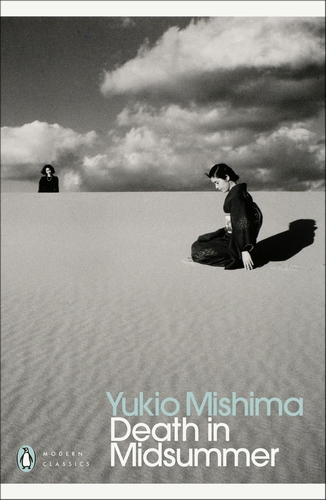Juhana reviewed Death in Midsummer by Yukio Mishima
Traditional Japanese Treats With a Modern Twist
3 stars
Yukio Mishima is something of an odd bird in the literary world. As a closet homosexual nationalist with a fixation on honour, death and bodybuilding, he evokes a strange fascination from people, especially after his farcical coup attempt that ended in bloody harakiri. Despite of these personal quirks – or perhaps because of them – he is still highly revered for his literary works, even if the author himself disowned them in the final chapter of his life.
But this collection of short stories are what the writer considered worth translating at the time, which gives a good glimpse into his literary capabilities. You always lose something in translation, and perhaps the many possible poetic meanings hidden in the kanjis are lost, but nevertheless this selection shows his versatility as an author of adopting different styles and genres skillfully. Surprisingly, for a self-proclaimed misogynist he sure writes a lot …
Yukio Mishima is something of an odd bird in the literary world. As a closet homosexual nationalist with a fixation on honour, death and bodybuilding, he evokes a strange fascination from people, especially after his farcical coup attempt that ended in bloody harakiri. Despite of these personal quirks – or perhaps because of them – he is still highly revered for his literary works, even if the author himself disowned them in the final chapter of his life.
But this collection of short stories are what the writer considered worth translating at the time, which gives a good glimpse into his literary capabilities. You always lose something in translation, and perhaps the many possible poetic meanings hidden in the kanjis are lost, but nevertheless this selection shows his versatility as an author of adopting different styles and genres skillfully. Surprisingly, for a self-proclaimed misogynist he sure writes a lot from the perspective of women in these stories, and not in a particularly shallow sense. Themes of death, love, traditions, the modernization of Japanese culture and duty run in all the writings.
Since this is a mixed bag, some of the treats are not as exciting or interesting as one would have hoped. But of the selection, three highlights emerged: The Priest of Shiga Temple and His Love tells a fairytale like story of an ascetic priest who falls in love with an imperial courtesan. Onnagata describes the different tensions when a young modern theater director arrives to a kabuki theater to direct a play with a cast of female impersonators. Lastly, Patriotism is Mishima at his most perplexing: a story of a young military couple committing ritual suicide in defiance to an order to crush a coup attempt. Love, duty and honour swirl into a bloody expression of sacrifical self-determination; an aggressively anachronistic and sincere morality play.

